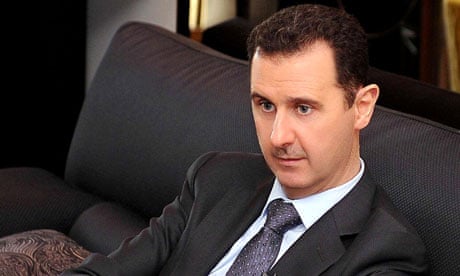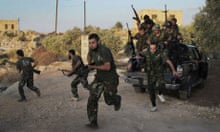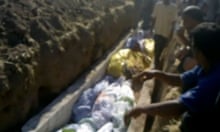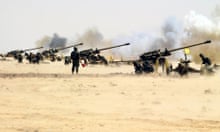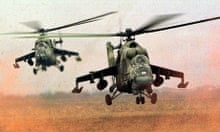Syria's armed forces have taken steps to secure deadly chemical weapons in response to mounting international concern that they could fall into rebel or terrorist hands or be accidentally damaged in fighting, according to Israeli officials.
Syria's undeclared chemical arsenal, the largest in the Arab world, is believed to include mustard gas as well as nerve agents such as Sarin, Tabun and VX, which have been "weaponised, tested and deployed", according to the Israelis, for whom Syria is a priority intelligence target.
US sources said Bashar al-Assad's forces had started to move part of the stockpile out of storage facilities, the Wall Street Journal reported on Friday. Israeli officials monitoring the escalating violence believe that Damascus is working to protect its chemical warfare arsenal.
"It is dispersed and under the control of a dedicated army unit that has a high degree of loyalty to the regime and is commanded by senior Alawites [Assad's sect]," said a senior official in Jerusalem. "It has not been involved in the nitty-gritty of fighting. It has been impacted by it but has not been used to fight the people. There are signs that Syria has understood the problem."
Bases in or near Homs, Hama, Deir al Zour and Aleppo all house long-range Scud missiles that are thought to carry chemical warheads. In recent weeks western sources have described intensified activity including the movement of rockets, the construction of new bunkers and the expansion of existing facilities.
The US officials told the Journal they were not certain whether this activity was to make the weapons ready to use against rebels or civilians, to safeguard the material or to complicate foreign efforts to track them.
"For the moment the Syrian regime is not significantly changing the location or the state of readiness of its chemical and biological weapons," the Israeli military commentator Ron Ben-Yishai wrote in Friday's Yediot Aharonot newspaper. "At the most it is moving them to more secure storage sites that are far from areas under rebel control or where fighting is taking place."
Alarm about the implications of Syria's bloody internal conflict echoes international concerns over the fall of the Gaddafi regime in Libya last year when advanced shoulder-launched anti-aircraft missiles were seized by the Nato-backed opposition forces. The Israeli official said Libya "might turn out to be a picnic compared to what could happen in Syria".
Diplomats say messages of western and Israeli concern about weapons proliferation have been passed to Syria via Russia, which has close ties with Assad. On Thursday the US government repeated a public warning to Syria that it had a responsibility to safeguard its stockpiles. The Syrian government denied that any had been moved.
The Israelis fear that al-Qaida or other extremist groups could get hold of chemical weapons; that Assad might transfer them to Hezbollah in Lebanon; or in an extreme scenario that he might launch an attack on Israel as a diversion. "Is there a possibility that an Assad regime with its back to the wall would try to change the subject and try to do something against us?" asked another senior Israeli government source.
Eyal Zisser, an Israeli academic, said: "As long as he feels he can win the battle in Syria, Assad has no reason to open a new front with Israel. When he decides that it's finished he will want to take Asma and the kids and escape from the palace. Israel will not be on his agenda."
Syria is an example of the adage that chemical weapons are the poor man's nuclear deterrent. Israel has a large but undeclared nuclear arsenal in addition to chemical weapons. In 2007 it bombed and destroyed what it described as a nuclear reactor in north-eastern Syria. Neither country has signed the chemical weapons convention, the international treaty that outlaws their use.
Along with Israel, the US, Britain, Jordan and Turkey are all following the Syrian situation closely. Risk assessments use plumology, the study of the dispersal and flow patterns of poison gases and chemical agents, which have different degrees of toxicity and persistence.
Washington is known to have held talks with Jordan about the need to co-operate on border security to prevent the smuggling of sensitive materials. It is also thought that Jordanian special forces, the most effective such units in the Arab world, could be used to secure bases in Syria in the event of a collapse of Assad regime. Israel refuses to confirm reports that it has contingency plans for dealing with the threat. "We are sharing our concerns with some of our closest interlocutors," the official said.
Western diplomats admit that the faulty intelligence about Saddam Hussein's weapons of mass destruction that was used to justify the 2003 Iraq war have made it extremely difficult to use the apparently more solid information about Syria's chemical arsenal to justify any outside military intervention.
